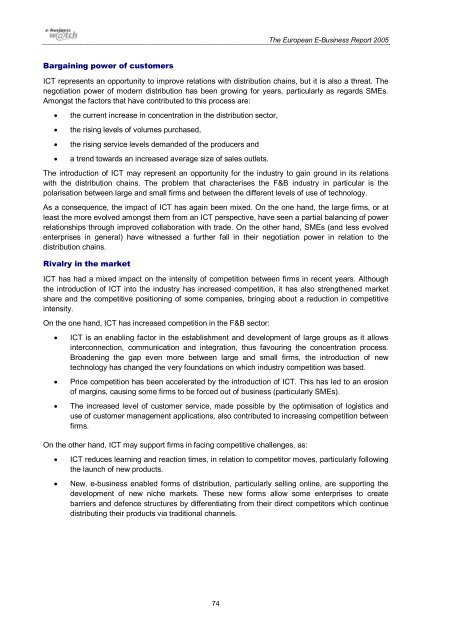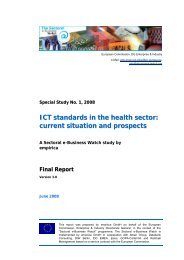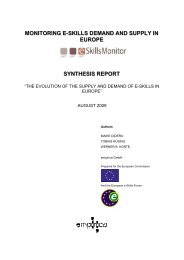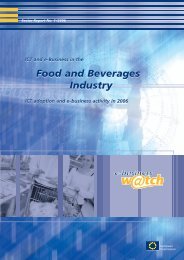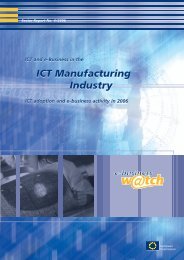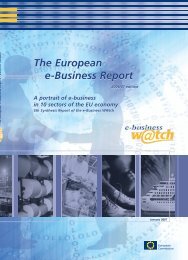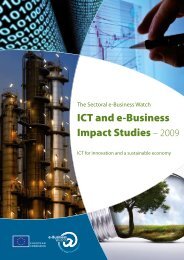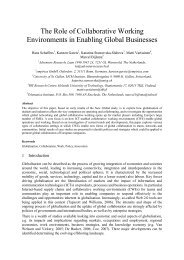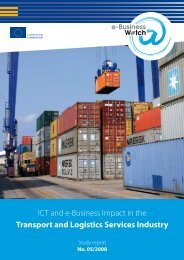The European e-Business Report The European e ... - empirica
The European e-Business Report The European e ... - empirica
The European e-Business Report The European e ... - empirica
You also want an ePaper? Increase the reach of your titles
YUMPU automatically turns print PDFs into web optimized ePapers that Google loves.
<strong>The</strong> <strong>European</strong> E-<strong>Business</strong> <strong>Report</strong> 2005<br />
Bargaining power of customers<br />
ICT represents an opportunity to improve relations with distribution chains, but it is also a threat. <strong>The</strong><br />
negotiation power of modern distribution has been growing for years, particularly as regards SMEs.<br />
Amongst the factors that have contributed to this process are:<br />
• the current increase in concentration in the distribution sector,<br />
• the rising levels of volumes purchased,<br />
• the rising service levels demanded of the producers and<br />
• a trend towards an increased average size of sales outlets.<br />
<strong>The</strong> introduction of ICT may represent an opportunity for the industry to gain ground in its relations<br />
with the distribution chains. <strong>The</strong> problem that characterises the F&B industry in particular is the<br />
polarisation between large and small firms and between the different levels of use of technology.<br />
As a consequence, the impact of ICT has again been mixed. On the one hand, the large firms, or at<br />
least the more evolved amongst them from an ICT perspective, have seen a partial balancing of power<br />
relationships through improved collaboration with trade. On the other hand, SMEs (and less evolved<br />
enterprises in general) have witnessed a further fall in their negotiation power in relation to the<br />
distribution chains.<br />
Rivalry in the market<br />
ICT has had a mixed impact on the intensity of competition between firms in recent years. Although<br />
the introduction of ICT into the industry has increased competition, it has also strengthened market<br />
share and the competitive positioning of some companies, bringing about a reduction in competitive<br />
intensity.<br />
On the one hand, ICT has increased competition in the F&B sector:<br />
• ICT is an enabling factor in the establishment and development of large groups as it allows<br />
interconnection, communication and integration, thus favouring the concentration process.<br />
Broadening the gap even more between large and small firms, the introduction of new<br />
technology has changed the very foundations on which industry competition was based.<br />
• Price competition has been accelerated by the introduction of ICT. This has led to an erosion<br />
of margins, causing some firms to be forced out of business (particularly SMEs).<br />
• <strong>The</strong> increased level of customer service, made possible by the optimisation of logistics and<br />
use of customer management applications, also contributed to increasing competition between<br />
firms.<br />
On the other hand, ICT may support firms in facing competitive challenges, as:<br />
• ICT reduces learning and reaction times, in relation to competitor moves, particularly following<br />
the launch of new products.<br />
• New, e-business enabled forms of distribution, particularly selling online, are supporting the<br />
development of new niche markets. <strong>The</strong>se new forms allow some enterprises to create<br />
barriers and defence structures by differentiating from their direct competitors which continue<br />
distributing their products via traditional channels.<br />
74


